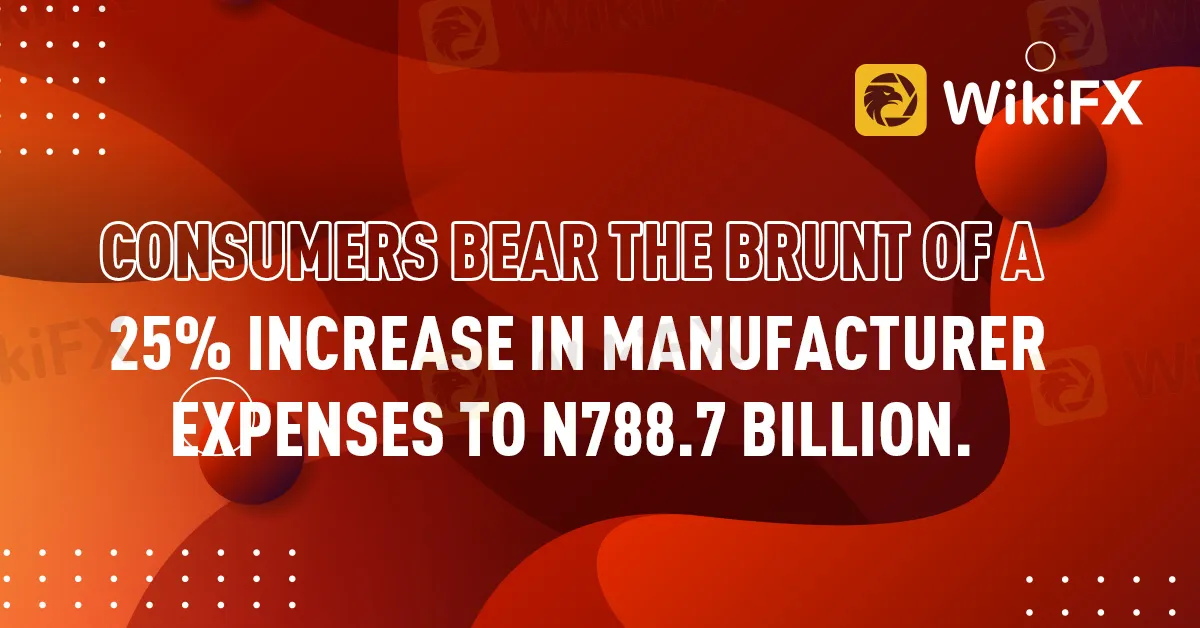简体中文
繁體中文
English
Pусский
日本語
ภาษาไทย
Tiếng Việt
Bahasa Indonesia
Español
हिन्दी
Filippiiniläinen
Français
Deutsch
Português
Türkçe
한국어
العربية
CONSUMERS BEAR THE BRUNT OF A 25% INCREASE IN MANUFACTURER EXPENSES TO N788.7 BILLION.
Abstract:Nigeria's consumer products manufacturing industry had a 25% increase in production costs in the first half of 2022, H1'22, despite the country's rising inflation. However, high cost is far more than the period's average inflation rate of 17%. This occurs despite the fact that the businesses are reporting slow growth and, in many instances, a flat reduction in output levels.

Nigeria's consumer products manufacturing industry had a 25% increase in production costs in the first half of 2022, H1'22, despite the country's rising inflation.
However, high cost is far more than the period's average inflation rate of 17%.
This occurs despite the fact that the businesses are reporting slow growth and, in many instances, a flat reduction in output levels.
Industry observers have identified a number of factors as the source of cost pressures, including concerns with energy costs related to fuel prices, rising foreign exchange costs for imported raw materials, high transportation costs, and higher labor costs, among others.
Nestle Nigeria Plc, Dangote Sugar, BUA Foods Plc, Nigerian Breweries, Guinness Nigeria Plc, Honeywell Flour Mills Plc, Cadbury Nigeria, PZ Cussons Industries, NASCO Allied Industries Plc, and GSK Consumer Nigeria Plc are among the businesses included in Financial Vanguard's findings basket.
Unilever Nigeria, Northern Nigeria Flour Mills, Union Dicon Salt Plc, Nigerian Enamelware Plc, International Breweries, Golden Guinea Breweries, Multi- Trex Integrated Foods Plc, among many others, are also among the cost leaders in the consumer products industry.
Top in rising costs
Among the companies with the highest costs is NASCO, which had an increase of nearly 57.6% to N16.8 billion in H1'22 from N10.6 billion in H1'21. Following closely after was GSK Consumer Nigeria Plc, whose operational costs increased by 56.1% to N11.0 billion from N7.1 billion in H1'21, and by 54.0% to N2.2 billion from N1.4 billion at Champion Breweries.
Nestle Nigeria Plc reported a cost increase of 43.4% to N75.3 billion from N52.5 billion in H1'21 and a cost increase of 41.9% to N146.6 billion from N103.5 billion in HI'21 for Dangote Sugar.
Companies with high production costs include BUA Foods Plc, which had the highest cost in H1 of 21 at N168.9 billion, Nigerian Breweries, which had a cost of N146.6 billion, and Dangote Sugar, which had a cost of N146.6 billion. Nestle reported N75.3 billion and Guinness Nigeria Plc N134.2 billion respectively.
The consumer products industry had revenue growth, which appears to be a consequence of the high cost of production that was passed on to consumers, despite the fact that inflation, rising unemployment, and other macroeconomic headwinds during the time period reduced consumers' purchasing power.
These companies' turnover and profit growth rates in H1'22 both exceeded the growth rates of the GDP and inflation, which were 3.54 percent and 18.6 percent, respectively, in the first half of the year.
In particular, the combined revenue of the 18 top firms in the manufacturing of consumer goods climbed by 29.6% to N1.16 trillion in H1'22 from N892.3 billion in H1'21.
Even more remarkably, their Profit Before Tax (PBT) increased from N 111.4 billion in H1'21 to N 173.85 billion in H1'22, a 56.1 percent increase.
Analysts highlighted that the Consumer Goods sector's performance was being held back by inflationary growth and added that, based on their turnover level, they must have passed along much more to consumers than their expenses, which had reduced effective demand.
However, given the remarkable achievement in their profit growth rate, they observed that the majority of the companies also did well in cost management.

Disclaimer:
The views in this article only represent the author's personal views, and do not constitute investment advice on this platform. This platform does not guarantee the accuracy, completeness and timeliness of the information in the article, and will not be liable for any loss caused by the use of or reliance on the information in the article.
Read more

PayPal Expands PYUSD Transfers to Ethereum and Solana
PayPal's PYUSD stablecoin can now transfer across Ethereum and Solana, enhancing flexibility for users through a LayerZero cross-chain integration.

Capital.com Shifts to Regional Leadership as CEO Kypros Zoumidou Steps Down
Capital.com transitions to a regional leadership model as Kypros Zoumidou steps down, promoting Christoforos Soutzis as CEO of its Cyprus operations.

eToro Launches Global-Edge Smart Portfolio: A Balanced Approach to Growth and Stability
Online trading platform eToro has recently unveiled its latest investment offering—the Global-Edge Smart Portfolio. This new addition to eToro’s extensive portfolio options provides investors with a balanced approach to investing by combining global stocks and bonds, tailored for those looking for growth and stability.

Webull Introduces 24/5 Overnight Trading to Extend U.S. Market Access
Webull has announced the launch of a new 24/5 Overnight Trading feature for U.S. users, developed in partnership with Blue Ocean ATS. This feature allows Webull’s clients to trade stocks and ETFs outside traditional market hours, from 8:00 pm to 4:00 am ET, Sunday through Thursday.
WikiFX Broker
Latest News
ATFX Expands LATAM Presence with New Mexico Office
CySEC Warns against Public Review Websites
Former Alameda Executives Hand Over Assets in FTX Creditor Recovery Effort
Tradeweb and TSE Partnership Enhances Access to Japanese ETFs
JUST Finance and UBX Launch Multi-Currency Stablecoin Exchange
XM Revamps Website with Sleek Design and App Focus
Global Shift in Cryptocurrency Taxation: Italy and Denmark Chart New Paths
Webull Introduces 24/5 Overnight Trading to Extend U.S. Market Access
TradingView & Mexico’s Uni. Partnership, to Enhance Financial Education
Something You Need to Know About SogoTrade
Currency Calculator


